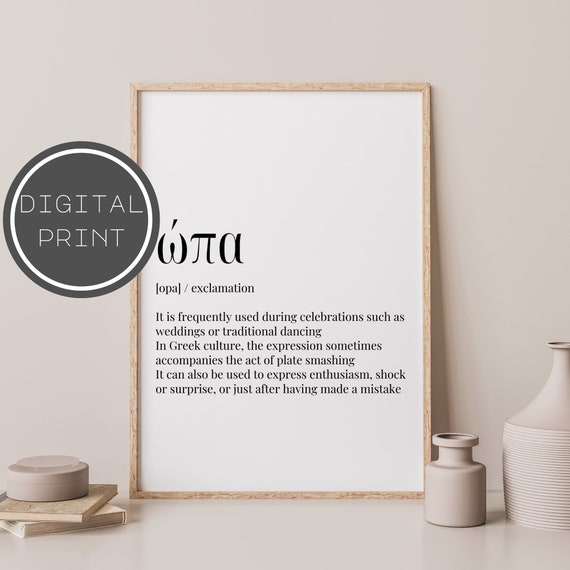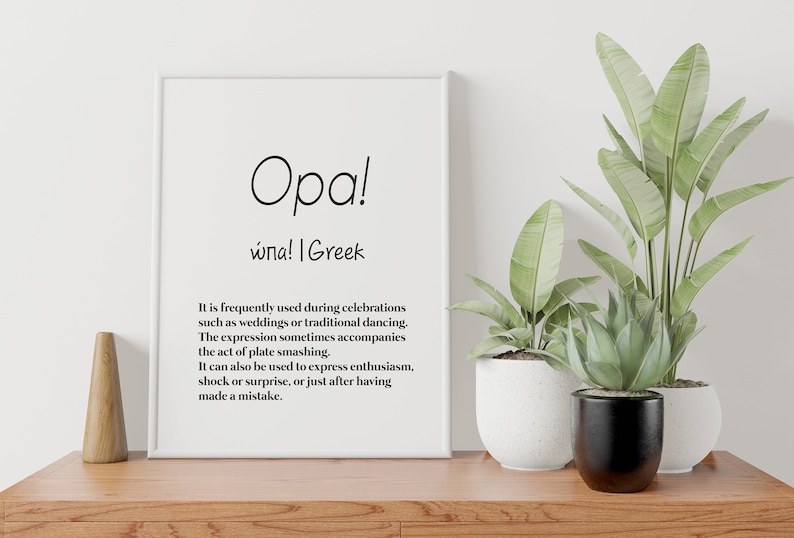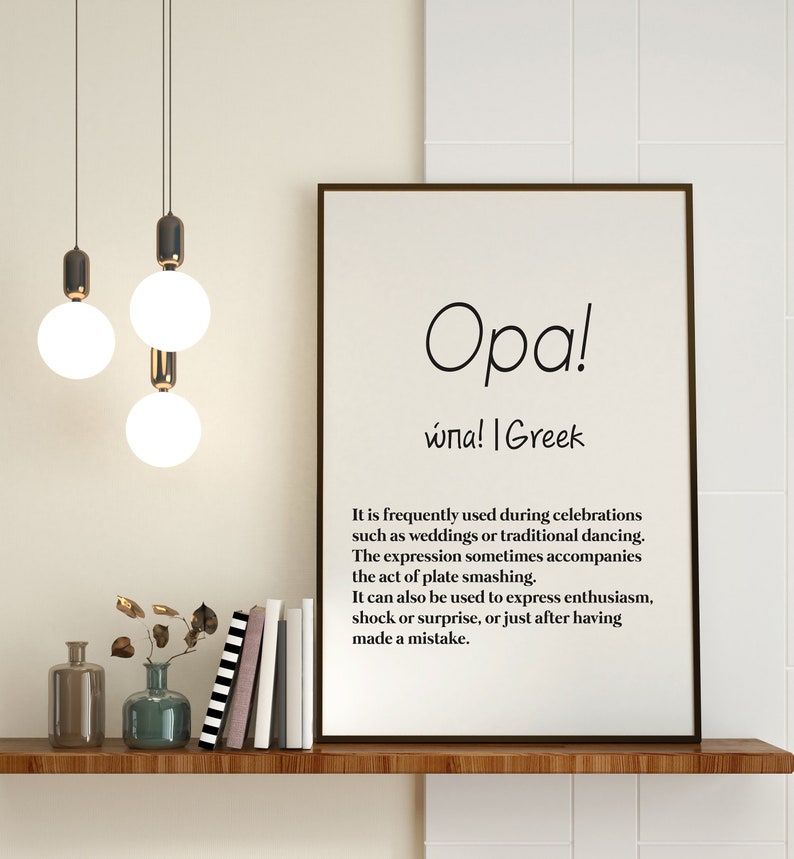"Opa!": Meaning & Uses In Greek Culture |
Ever heard a word that encapsulates the spirit of celebration, joy, and even a touch of playful chaos? "Opa!" a seemingly simple exclamation is far more than just a sound; it's a cultural cornerstone woven into the fabric of Greek life and beyond.
This ubiquitous expression, a sound as familiar in bustling Mediterranean marketplaces as it is in the heart of a family celebration, transcends a simple definition. Its roots run deep, echoing through centuries of tradition, history, and the vibrant, often boisterous, soul of the Greek people. While "Opa!" might be immediately associated with the joyous smashing of plates, a celebratory ritual synonymous with Greek festivities, the word's meaning is far more expansive, reflecting a spectrum of emotions and usages that make it a truly versatile and captivating linguistic gem.
Before we delve deeper, let us know about a remarkable individual who helped shape our knowledge about this word, lets take a look at the table given below:
- Monica Richards Jay Harrington Divorce Career Life Insights
- Greg Gutfeld Is He Gay Sexuality Partner Explored
| Aspect | Details |
|---|---|
| Name | Alex Pattakos |
| Title | PhD, Author, Speaker |
| Focus | Meaning in Life, Greek Philosophy, Culture |
| Key Work | "Prisoners of Our Thoughts: Viktor Frankl's Principles in Action" |
| Concept of 'Opa!' | Embracing passion and joy in life, inspired by Greek philosophy and customs |
| Notable Achievement | Applying Greek philosophy for a more meaningful life |
| Inspiration | Derived from Greek philosophy, traditional village customs |
| Link to Reference | Alex Pattakos Official Website |
The word itself, transcribed in Greek as "\u038f\u03c0\u03b1", appears to be a linguistic chameleon, adapting to its environment and mirroring the speaker's intention. Is it an expression of unbridled joy, a toast raised in camaraderie, a warning before a plate shatters, or a playful acknowledgment of a minor mishap? The answer, quite simply, is "all of the above." This is the core of its enduring appeal.
In a world often preoccupied with rigid definitions and precise translations, "Opa!" thrives in ambiguity. It is an emotional exclamation, an interjection of feeling that needs no literal equivalent in other languages. It resonates with the energy of the moment, whether that moment is one of triumphant accomplishment or simply the shared experience of a life fully lived. It can be a whoop of delight at a wedding, a rallying cry during traditional dances, or even a verbal "oops" as a clumsy gesture unfolds.
The word's versatility allows it to play a pivotal role in various social settings. Think of the celebrations, the weddings, and the festivals where "Opa!" punctuates the air. It is the verbal embodiment of collective exhilaration, a shared experience that unites participants in a moment of pure, unadulterated joy. The rhythm of life in Greece, and other Mediterranean and Middle Eastern cultures where this expression is prevalent, pulses with the spontaneous eruptions of "Opa!", a vocal punctuation mark to the exuberance of living.
- Eduardo Tamayo Tulsi Gabbard Their Story Divorce Learn More
- Park Boyoungs Relationship Timeline Dating History Rumors Explained
The association with plate smashing is perhaps the most visually striking aspect of "Opa!"'s usage. This tradition, though now less common than it once was, provides a dramatic illustration of the emotional release embedded in the word. The smashing of plates, often initiated with a hearty "Opa!", symbolizes the letting go of troubles, the embracing of a fresh start, and the unleashing of a collective energy. This can be viewed as a ritualistic catharsis, a way to cleanse the slate and make way for renewed happiness.
It's a word that captures the essence of the Greek spirit. It speaks to the importance of joy, community, and the appreciation of life's simple pleasures. But its origins extend beyond the shores of Greece. The expression and its equivalent can be found across a wide swath of cultures, including Eastern European, Middle Eastern, North African, South Asian, Latin American, and even in some Hebrew contexts. The very universality of this expression speaks to the shared human need to articulate and celebrate moments of heightened emotion.
Moreover, the word is not just for grand celebrations. In everyday life, it can be used in scenarios as varied as expressing surprise, excitement, or even acknowledging a small blunder. It is a testament to the flexibility of the language, and its ability to reflect the intricacies of human experience.
The use of "Opa!" as a mantra for life is another fascinating facet of its meaning. For those inspired by Greek philosophy and culture, it can serve as a reminder to approach life with enthusiasm, purpose, and a positive attitude. Alex Pattakos, a prominent figure in the field of meaning-centered living, has adopted "Opa!" as a guiding principle, drawing inspiration from the rich history and traditions of Greece. This showcases the expressions potential beyond mere exclamation it may be a life philosophy too.
It is also important to note how the word functions in different contexts. While the literal translation might not always be direct, the meaning shifts with the situation. In dedicated plate smashing sessions, it might mean "pay attention," while in moments of celebration, it's simply an exclamation of joy. This adaptability is part of the word's charm.
Furthermore, there's a cultural significance to understand the nuances of its usage. One must understand the context to derive the correct meaning, such as the "Opa!" screamed at a wedding is vastly different from the "Opa!" used to react to a minor slip-up. The word functions both as a cultural marker and as an emotionally charged response.
The influence of the word extends beyond the Greek language, as evidenced by its inclusion in popular culture. Greek singer Giorgos Alkaios's performance at the Eurovision Song Contest in 2010, where he sang "Opa!" as a message to his compatriots during a difficult time, showcases its cultural resonance and its capacity to convey sentiments of hope and resilience.
The words power to express the human spirit is remarkable, and it often resonates with the joy, excitement, and camaraderie. Therefore, "Opa!" is not simply a word. Its a reflection of the spirit of the Greeks, and it stands as a testament to the enduring vitality of the culture itself. It is an invitation to embrace life with passion, joy, and a healthy dose of exuberance.
The concept of "Opa!" can be considered an example of cultural exchange and shared human experiences. It demonstrates how a simple word can transcend linguistic boundaries and become a symbol of a shared emotional response across various cultures and communities. This is the charm of the word, its ability to bring people together.
Lastly, the history of the word and its usage is closely linked to the traditions and practices of the Greek people. This word is not merely an utterance but part of a complex web of traditions, rituals, and celebrations. It serves as a reminder of the profound impact of cultural context on language and the power of a simple expression to embody a nation's soul.
In a world that sometimes seems to emphasize formality and precision, "Opa!" stands as a vibrant symbol of the human ability to express emotion and celebrate life. It is a linguistic treasure, a cultural touchstone, and a resounding affirmation of the joy of being alive.
- David Bromstad News Wife Age My Lottery Dream Home Updates
- Gali Golan Nude Photos Videos Hot Leaks Onlyfans Content

Opa Definition Greek Words Zorba Dance Greek Dance Opa Etsy Australia

Opa GREEK Word Definition Home Decor Printable Poster Digital Wall Art

Opa GREEK Word Definition Home Decor Printable Poster Digital Wall Art